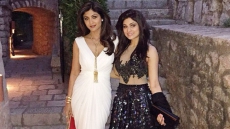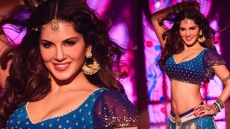Superstar Shah Rukh Khan's inimitable style combines with Nobel laureate poet Rabindranath Tagore's timeless symphony in luring visitors from faraway lands to West Bengal in its latest tourism promotion ad, that cuts through stereotypes.
The three-and-half minutes long video montage takes viewers from Bengal's chandeliered Rajbaris, ceiling-high stacks of books in College Street's alleys, immersive terracotta temples of Bankura, psychedelic masked Chhau dancers, Sundarbans mangrove's fisherfolk with backward facing masks to the rolling tea gardens of Darjeeling hills -- all through the eyes of a foreigner.
The film, which has received "an overwhelming response" from viewers on social media, sees Shah Rukh, Bengal's brand ambassador, crooning to Tagore's "Ami Chini Go Chini Tomare, O Go Bideshini" ("I know you, oh lady from faraway land") while serenading the foreigner in a tram car.
"We have received extremely positive response from the ad and it is being shared all across on social media as part of our aggressive tourism campaign," Bengal Tourism Minister Gautam Deb said.
"The essence of our tagline 'Welcome to Bengal - The sweetest part of India' is the state's hospitality which caters to guests from India and abroad. We want foreigners to think of Bengal first when they see the ad and plan to visit India," he said.
An Ogilvy & Mather, Kolkata, concept, the film has been directed by Prakash Varma of Nirvana films.
Instead of opting for typical Bengal tourism props such as rosogollas (spongy sweetmeats) or hand-pulled rickshaws, the montage offers glimpses of relatively lesser known facets such as the state's age-old relationship with graffiti art and its love for mustard-infused bhetki paturi (fillet of bhetki in banana leaf envelopes).
A touch of tradition is played out as the foreigner indulges in Sindoor Khela (women smear vermilion at each other at the conclusion of Durga puja), listens to baul music and drives through the expansive Howrah Bridge across the Hooghly river.
Reflecting the continuity of cultures, one rides along with the fair lady, who comes to attend a wedding, in buses, a yellow cab, the toy train and the tram. Her journey is matched to score with a background laced in baul tunes and sounds of the Shehnai, with the lilting tunes of Tagore accentuating the ebb and flow of a sojourn.




